Loperamide maximum daily dose. When is Loperamide given to children?
Each of us at least once in our lives faced with the fact that due to the unexpected appearance of diarrhea, plans (whether it be work or leisure) collapse, which is undoubtedly upsetting. At all times, this problem was acute, since a hundred years ago it led to deaths. AT modern medicine with the development of pharmacology appeared effective methods, which practically reduced to zero the percentage of mortality from this symptom complex. Many mistakenly consider it an independent disease - it is not.
Diarrhea (diarrhea) is a symptom characteristic of such diseases caused by infections:
- Dysentery
- Paratyphus A and B
- Typhoid fever
- Rotavirus gastroenteritis
- Giardiasis
- Yersiniosis
- Amoebiasis
- Staphylococcal food poisoning
- Botulism
- Salmonellosis and other infectious diseases
In addition, manifestations of diarrhea are possible with intestinal tumors and intoxications. various etiologies. Also - with non-specific diseases of the intestines and diseases of the endocrine system, diseases of the pancreas and stomach, allergic and metabolic diseases.
Modern medicine has a wide range of antidiarrheal medications of various effects. It is often very difficult for the layman to choose one or another drug to get rid of diarrhea.
Why Loperamide?
Currently one of the most effective means getting rid of diarrhea (diarrhea) is the drug Loperamide. Why exactly him? Yes, because it is able to have a pronounced antidiarrheal effect, which effectively and quickly eliminates diarrhea. So what exactly is this drug prescribed for? The main direct indication for use is diarrhea caused by a change in the nature of the diet (travelers' diarrhea),.
In these cases, as a rule, the cause of diarrhea "goes out" with the first liquid bowel movements, and then you lose electrolytes and water, which can lead to complications. It is in such cases that a one-time use of Loperamide is appropriate without first consulting a doctor, only in emergency cases.
Pharmacological action of the drug
The active substance of the drug Loperamide binds to the opioid receptors of the circular and longitudinal muscles of the intestinal wall and is able to inhibit the release of acetylcholine. This helps to reduce intestinal motility and tone by suppressing the release of prostaglandins and increasing the tone of the circular muscle that compresses the anus (anal sphincter).
Loperamide acts quickly and keeps the effect up to 6 hours.
Due to this, the urge to defecate appears much less frequently. These processes directly stimulate the absorption of water and salts from the intestines, which helps to reduce dehydration and electrolyte deficiency. Reception of Loperamide does not cause drug dependence and addiction.
Release form and storage conditions

Loperamide - quick help!
Loperamide is produced in capsules, tablets, soluble "effervescent" tablets, solution, as well as in syrup. Liquid and soluble forms are very convenient for use by children and patients with difficulty in swallowing (bed patients, senile people).
There are no special storage requirements for Loperamide. You should follow the expiration date of the drug indicated by the manufacturer on the package and store it at an ambient temperature of no more than +25 degrees Celsius.
Doses and methods of application
Loperamide is taken orally. It is customary for adults to give 4 mg at the first dose, and then, depending on the course of the disease, after each unformed stool, 2 mg, while it is necessary to ensure that daily dose did not exceed 16 mg.
If the drug was prescribed in the form of drops, then the dosage and administration is carried out as follows: the first dose is 60 drops, then after each shapeless (liquid) stool, 30 drops, but not more than 6 times, 30 drops per day.
Children are allowed to use the drug from two years of age at the rate of 0.004 mg per kilogram of the child's weight. This dosage is maintained until the age of eight. From the age of 8, Loperamide is prescribed at a dose of 2 mg, but not more than 8 mg per day. If the child takes the drug in drops, then the daily dose should not exceed 120 drops divided into four doses.
If, despite taking Loperamide, diarrhea continues for one to two days, and in children, regardless of the duration of diarrhea, a doctor's consultation is immediately necessary!

When should you stop taking this drug? If the stool has acquired a normal consistency or is absent for 12 hours, then in order to avoid complications in the form of severe constipation, the drug should be stopped.
In parallel with taking Loperamide, it is necessary to replenish the loss of water and electrolytes that are lost with each act of defecation. For this, special rehydration mixtures are used.
Overdose and side effects of the drug Loperamide
Signs of an overdose of the drug that occur when the doctor's recommendations are not followed and the dose of the drug is exceeded can have serious manifestations up to respiratory arrest, loss of consciousness and coma - from the side of the central nervous system and PNS:
- Respiratory depression
- Disorientation in place, time
- memory impairment
- Attention disorder
- Dizziness
- Drowsiness or insomnia
- Stupor
- Increased muscle tone
- visual impairment
From the genitourinary and excretory system:
- Urinary retention
- Difficulty sweating (despite high fever)
- Libido disorders and sexual dysfunction
From the digestive system:
- Dryness in labor
- Appetite disorder
Side effects of Loperamide are directly related to the mechanism of action of the drug:
Violations by nervous system:
- Impaired coordination
- Depression and loss of consciousness
- Dizziness
- Drowsiness
- Hypertension
- Stupor
- Gastrointestinal disorders
- Dry mouth
- Bloating
- Pain and discomfort in the abdomen
- Vomit
- Pain in the epigastrium (upper abdomen)

Diarrhea is not an independent disease, but a symptom!
Subcutaneous tissue and skin disorders:
- Hives
- Angioedema
- Bullous rash (including Stevens-Johnson syndrome, erythema multiforme, and toxic epidermal necrolysis)
From the side immune system: extremely rare
- Anaphylactoid reactions
- Hypersensitivity reactions
- Anaphylactic shock
- General disorders - rare
- Decreased general tone, fatigue
If at least one of the above symptoms appears, you should urgently stop taking Loperamide and consult a doctor immediately.
Contraindications
It must be remembered that taking loperamide without a doctor's prescription can cause irreversible severe consequences and harm to your health. Contraindications to the use of the drug Loperamide are:
- Children under the age of two.
- Patients with a history of allergic reaction to loperamide or its components.
- Treatment of diarrhea with the presence of blood in the stool.
- Treatment of diarrhea and dysbacteriosis against the background of antibiotic therapy.
- The presence of concomitant pathology in the form of megacolon and intestinal obstruction.
Special instructions for the use of the drug Loperamide
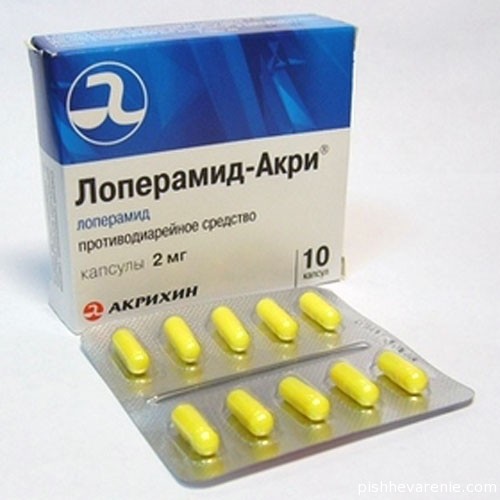
The use of the drug Loperamide has a symptomatic purpose and does not affect the cause of diarrhea. Therefore, its appointment is limited in such cases as pregnancy, HIV / AIDS, severe liver disease, kidney disease, ulcerative processes in the intestines, motor transport workers and workers with mechanisms (because it affects the accuracy and concentration of attention).
Interaction with other drugs
It must be remembered that when taking loperamide, drugs that depress the central nervous system (quinine) and protease inhibitors (ritonavir) should not be taken simultaneously, as this leads to an increase in the level of its concentration in the blood several times and makes it difficult to excrete from the body.
Also, taking along with Loperamide such groups of drugs as antiarrhythmic (verapamil), (ketoconazole) is dangerous by reducing signs of respiratory depression, which can lead to sudden respiratory arrest.
In conclusion, I would like to say that the use of Loperamide does not lead to the elimination of the cause of the disease and is symptomatic treatment. Therefore, it should be used as ambulance» and immediately look for the cause of diarrhea in a medical facility.
Loperamide is a medicinal product, strictly certified, its production is controlled by special quality control structures, so when you purchase it, you can be sure of its properties, which cannot be said about "grandmother's" treatments with unpredictable results.
Don't try to wait and hope that the diarrhea will go away as suddenly as it started! Take your health seriously and it will surely thank you. Remember - self-medication is harmful to your health.
diarrhea problems and pharmacological properties drug "Loperamide":
Noticed an error? Select it and click Ctrl+Enter to let us know.
Tell your friends! Share this article with your friends on your favorite social network using the social buttons. Thank you!
Loperamide helps with diarrhea, which always starts at the most inopportune moment. Many people because of this disease have to adjust their plans, cancel important trips and meetings. The drug normalizes bowel function and allows you to get rid of an unpleasant problem in a short time. But before you start using it, you need to carefully study the annotation, as there are a number of side effects and contraindications.
General characteristics of the drug
Loperamide refers to antidiarrheal agents that lower the tone and motility of the intestines, due to a strong decrease in the production of prostaglandins and acetylcholine. This helps to increase the residence time of feces in the intestinal cavity and improve the tone of the sphincter, resulting in a decrease in the frequency of urge to go to the toilet.
Loperamide for diarrhea is available in regular tablets, capsules, soluble tablets, solution and syrup for children. Liquid varieties of the drug are convenient to give to children and patients who have difficulty swallowing - the elderly and bedridden patients.
There are no special instructions regarding the storage of the medicinal product. The instructions indicate that the medication should be stored at room temperature, which does not exceed +25 degrees.
It is necessary to periodically review the expiration date on all medicines that are in the home medicine cabinet, and replace them if necessary.
Indications for appointment
Loperamide tablets for diarrhea are prescribed for acute and chronic disorders, which may be the result of various factors. The drug is indicated for complex treatment such states:

- diarrhea due to an allergic reaction;
- disorder due to severe stressful situations;
- diarrhea during treatment with certain drugs;
- bowel disorder with radiation sickness;
- diarrhea due to a sudden change in diet;
- with irritable bowel;
- diarrhea of various origins, which is accompanied by a loss of minerals;
- diarrhea caused by inflammation;
- severe diarrhea, which can lead to serious complications;
- to normalize stool in people with an ileostomy.
Loperamide is taken for diarrhea caused by infectious diseases, exclusively as an additional drug, the effect of which is aimed only at reducing severe symptoms.
How to drink medicine
For diarrhea caused by poisoning and other causes, the initial dosage for adult patients is 4 mg, after which they drink 2 mg of the drug after each bowel movement. The maximum allowable daily dosage should not exceed 16 mg. At chronic diarrhea the initial dose is 4 mg, and then such a maintenance amount is calculated so that bowel movements occur no more than twice a day. The dose is set individually, it should be from 2 mg to 12 mg per day.
If acute diarrhea is observed in a child, then loperamide is prescribed depending on age and weight:
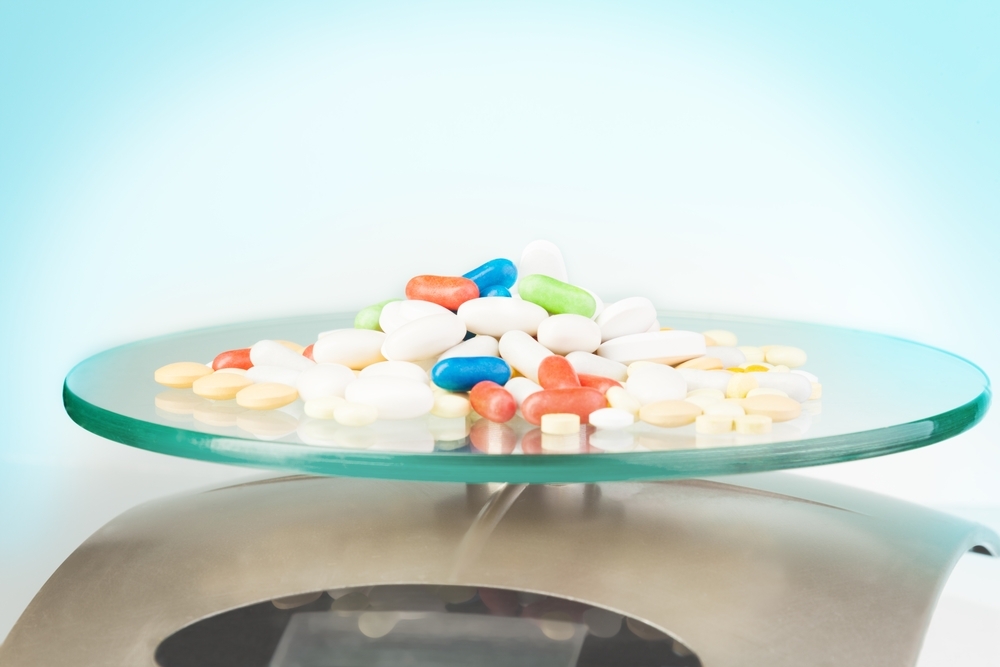
- 2-5 years - 1 mg (this is half a tablet) three times a day;
- 6-8 years - 2 mg (one tablet) twice a day;
- 9-12 years - 2 mg (one tablet) three times a day.
If diarrhea has not stopped on the second day of therapy, then tablets for diarrhea begin to be given at the rate of 1 mg per 10 mg of weight. The daily dosage should not be more than at the beginning of treatment.
In acute diarrhea in children who are already 5 years old, 2 mg of the drug is given immediately as first aid, then the same amount is given after each bowel movement, but not more than 8 mg per day. With chronic diarrhea in a child, one tablet is given for the first time, and then the dosage is calculated individually. The maximum allowable daily dose should not exceed 6 mg per 20 kg of body weight.
If diarrhea does not decrease after 2-3 days of therapy, then you need to urgently see a therapist or gastroenterologist to pass a series of tests and prescribe adequate treatment.
Contraindications
The drug for diarrhea has a number of contraindications, which must be taken into account before prescribing:

- Individual intolerance to some of the components that make up the drug.
- Suspicion of intestinal obstruction.
- Ulcerative diseases.
- Polyps in the intestines.
- Infectious diseases of the digestive tract - dysentery, salmonellosis, cholera and enterocolitis.
- The first three months of pregnancy and the period of feeding the child.
- Do not give children under 2 years of age loperamide for diarrhea in tablets or under 6 years of age in capsules.
- Special conditions in which constipation is unacceptable.
- It is forbidden to drink the drug if there is blood in the stool.
- With flatulence
- With persistent constipation.
Liver failure is considered a relative contraindication to the appointment. With such a pathology, loperamide is allowed to be used only under the supervision of the attending physician. If during therapy the condition of the liver is satisfactory, then the medication can be safely used. At the slightest deterioration in the condition, loperamide is canceled and the treatment is adjusted.
At any stage of pregnancy and breastfeeding, loperamide can be prescribed by a doctor only in exceptional cases, when the expected benefit far outweighs the possible harm.
Side effects
There are many side effects of loperamide. At long-term use remedies for diarrhea, disorders of the nervous system can be observed - impaired coordination, dizziness, drowsiness and stupor. Gastrointestinal disorders - bloating and pain in the abdomen, vomiting and persistent constipation. Often found allergic reactions especially in people who have hypersensitivity. There may be rashes in the form of urticaria or a confluent character, as well as anaphylactic shock.
If at least some health disorders appear, immediately stop treatment with loperamide. In severe conditions, urgently consult a doctor, as specific treatment may be needed.
Overdose
In case of non-compliance with the therapeutic dose or in case of improper storage medicines, in a place accessible to young children, the following overdose symptoms may occur:

- the coordination of all movements is disturbed;
- atypical drowsiness;
- pupils constrict;
- the tone of the entire muscular system increases;
- breathing is disturbed;
- may be intestinal obstruction.
In severe poisoning, there may be a disruption in the functioning of organs and systems, which often leads to an unconscious state, and sometimes coma.
Overdose treatment
At the first sign of an overdose, an ambulance is immediately called and, until the doctor arrives, first aid is provided to the victim. The algorithm of actions is as follows:
- The stomach is washed with a large volume of clean water. If there is manganese in the house, then you can prepare a slightly pink solution that flushes the stomach cavity more effectively.
- Give adsorbents in accordance with the attached annotation.
- If the patient's breathing is disturbed, a series of resuscitation measures are carried out.
If the overdose is significant, then it is urgent to administer an antidote to the victim, which is the drug naloxone. When the condition does not improve after a while, the antidote is re-introduced.
The arriving doctor is shown the packaging of the drug that provoked the poisoning. At the same time, the approximate number of tablets that a person has consumed is indicated. With timely assistance, the consequences of an overdose pass without a trace in a few days.
Cases when diarrhea suddenly appears are not uncommon. A person cannot do business, leave the house. When this situation occurs frequently, people know that the drug Loperamide will help. It is important to carefully study the instructions so that the use does not cause complications.
Instructions for use Loperamide
This antidiarrheal drug does not treat the cause of the disease, but only relieves the main symptom - diarrhea. The manual describes what is active substance in the preparation - loperamide hydrochloride - does not affect the reproduction of Escherichia coli. When ingested, this remedy:
- slows down intestinal motility;
- reduces the tone of muscle fibers;
- reduces motility;
- slows down the time of movement of feces;
- increases the tone of the sphincter;
- reduces the number of urges;
- promotes retention of feces;
- gives density to feces.
The use of loperamide hydrochloride helps in the treatment of chronic and acute form non-infectious diarrhea. Indications for use according to the instructions are diarrhea, which manifests itself as a result of:
- food allergies;
- emotional overstrain;
- radiation therapy treatment;
- actions medicines;
- changes in the composition of food, water;
- eating disorders.
Loperamide - what helps
According to the instructions, the use of Loperamide is prescribed for severe diarrhea that lasts a long time. The indications are the regulation of stool after surgery in patients with ileostomy. Why does the drug Loperamide help with the greatest efficiency? The medicine has indications for use in cases of:
- malabsorption;
- inflammatory processes;
- irritable bowel syndrome;
- metabolic disturbances.
Composition of Loperamide
The list of substances that are included in the structure of the drug is headed by active ingredient- loperamide hydrochloride. Pharmaceutical firms can administer the remaining ingredients in different combinations depending on the form of release - tablets or capsules. The composition of the drug Loperamide includes:
- lactose;
- corn (potato) starch;
- aerosil;
- magnesium (calcium) stearate;
- silicon dioxide.
Instructions for use Loperamide
The medicine is produced in the form of drops, tablets and capsules, but the liquid solution has not gained distribution in Russia. Instructions for Loperamide prescribes its use for non-infectious diarrhea, or as a concomitant treatment for infections. Recommended during application:
- observe the dosage for an adult, a child;
- consider contraindications and side effects;
- Avoid concomitant use with alcohol.
According to the instructions, during the use of Loperamide, it is necessary to take into account:
- the medicine begins to have an effect in an hour;
- it is required to replenish the loss of fluid and trace elements;
- use with caution in the elderly;
- at chronic form diseases, the dosage and treatment regimen is prescribed by the doctor;
- there is no compatibility with opioid analgesics - constipation is possible;
- the effect of the remedy lasts up to 5 hours.
When using Loperamide, the instruction prescribes to carefully consider the following points:
- stop using, consult a doctor to clarify the diagnosis, if diarrhea does not stop for two days;
- the medicine slows down the reaction - you should be careful while working with equipment, when using transport;
- take with caution in liver failure - possible disruption of the central nervous system;
- stop using the medicine if you experience constipation, bloating, signs of intestinal obstruction.

Loperamide - instructions for use for children
Treatment of diarrhea in childhood should only be handled by a pediatrician. This is due to the fact that in babies, infections that require antibiotic treatment are a common cause of diarrhea. Loperamide for children is not allowed to be used earlier than 4 years - there are cases of intestinal paralysis, possible effects on the central nervous system. There are contraindications for the use of loperamide:
- age up to 2 years;
- bloating;
- constipation;
- inflammatory diseases ZhTK;
- colitis after taking antibiotics;
- intolerance to components;
- dysentery with elevated blood temperature in the stool.
The instruction recommends the use of Loperamide, starting from the age of 6, in the form of capsules. It is necessary to correlate the dosage with the age of the child. Maximum per day, it should not exceed 8 mg. At the age of 6 to 8 years, with an acute form of diarrhea, 1 capsule is prescribed at the first dose, then, after each case of diarrhea, one more. If after two days of treatment it does not get better - the diarrhea does not stop - an increase in dosage is acceptable, but only as directed by a doctor. Children over 8 years of age are prescribed one capsule three times a day.
Is it possible to give loperamide to children with diarrhea
Although the annotation of Loperamide allows the use of the drug in children from 4 years of age, pediatricians insist on its prohibition. Especially if parents do it on their own, without a doctor's prescription. Often diarrhea is caused by infectious processes, in which diarrhea is a blessing, because it removes toxins. Otherwise, poisoning of the body is possible. In addition, parents often forget to give their child water to compensate for water loss, which causes dehydration.
Loperamide is allowed to be given to children only after 6 years under the strict supervision of a physician. This is due to the fact that during the use of the drug are possible:
- stop peristalsis;
- food bolus retention in the intestines;
- absorption of liquid with toxins into the blood;
- swelling of the large intestine;
- tissue necrosis;
- circulatory disorders;
- intestinal paralysis;
- life threat.

loperamide during pregnancy
Although the drug is inexpensive and available, it can be dangerous for pregnant women to take it. Can Pregnant Women Take Loperamide? In the first three months is strictly prohibited. This is due to the formation during this period in the unborn child of the main systems and organs, which can be disturbed. At a later date, the decision to take the medicine should be made by the doctor, taking into account the threat to life. future mother and fetus. The effect of loperamide on the intrauterine development of a child has not been fully studied.
How to take Loperamide
What the drug has good feedback and freely sold at an affordable price, does not mean its thoughtless use. It is advisable to discuss this issue with the doctor. How to drink Loperamide? It depends on the nature of the course of the disease. In the chronic form in adults, 4 mg is prescribed per day. Acute diarrheal disease is treated with a maximum daily dose of 16 milligrams. Treatment regimen:
- first dose - 2 tablets or capsules;
- after each diarrhea - one.
loperamide tablets
Positive feedback was received by the drug, produced in the form of tablets, the price of which is an order of magnitude lower than that of the analogue - Imodium. They are covered with a special shell, have a white or pale yellow color. It is convenient that Loperamide does not need to be washed down with water - they are placed on the tongue and absorbed. During the reception, a tingling, burning sensation in the mouth is possible. The drug begins to act in an hour. The dosage is 2 mg.
loperamide capsules
The affordable price of the drug makes it possible to have it on hand when a person needs to quickly cope with non-infectious diarrhea. According to the instructions, taking the drug in the form of a capsule for diarrhea requires drinking water. Inside the gelatin shell is a powdery substance of white or yellowish color. Capsules are swallowed without chewing, the dosage is similar to tablets.
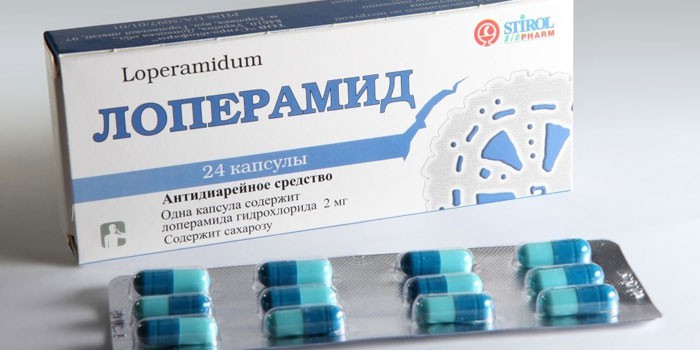
Loperamide - contraindications
Instruction Loperamide does not recommend the use of the drug during infectious diarrhea. In such a situation, harmful bacteria, viruses, must be excreted from the body, and diarrhea contributes to this. If it is stopped, the absorption of toxins into the blood will begin, which will worsen the patient's condition. For the same reason, the use of this antidiarrheal medicine for poisoning is prohibited.
There are contraindications for loperamide during an acute form of dysentery with blood in the secretions and fever. According to the instructions, the use of the drug is prohibited in case of:
- intestinal obstruction;
- acute ulcerative colitis;
- lactose intolerance;
- constipation
- sensitivity to components;
- 1 trimester of pregnancy;
- breastfeeding;
- diverticulosis;
- monotherapy for dysentery.
Loperamide - side effects
Due to the affordable price, the drug can be found in home medicine cabinets. The medicine is used without the consent of the doctor, without thinking that the side effects of Loperamide are possible. If the drug is used in large quantities, it is recommended to take the antidote drug - Naloxone. According to the instructions, with an overdose, the following are observed:
- respiratory depression;
- drowsiness;
- lack of coordination;
- stupor;
- intestinal obstruction.
Due to the active effect of the antidiarrheal drug on the body, its long and uncontrolled intake, side effects may occur. The use of alcohol exacerbates this situation. Loperamide's instruction notes that they observe:
- allergy;
- lethargy;
- skin rashes;
- dizziness;
- insomnia;
- intestinal colic;
- bloating;
- nausea;
- stomach pain;
- dry mouth;
- vomiting;
- abdominal discomfort;
- flatulence;
- dehydration;
- electrolyte disturbances;
- urinary retention.

Loperamide price
This drug is sold without prescription in pharmacies, unlike analogues, it has an affordable price. It is possible to order it on special sites, buy it in an online pharmacy. How much does Loperamide cost? The price depends on the number of tablets, capsules in the package, the form of release and the manufacturer. The cost of Loperamide and its analogues in rubles is for 20 pieces:
- tablets - 15-100;
- capsules - 25-95;
- Loperamide-akri - 50-70;
- Diara - 250-280;
- Imodium - 510-640.
Video: how Loperamide works
(lat. Loperamide) is an antidiarrheal drug.
Chemical compound: 4-(4-Chlorophenyl)-4-hydroxy-N,N-dimethyl-alpha,alpha-diphenyl-1-piperidine butanamide (as hydrochloride). Empirical formula C 29 H 33 ClN 2 O 2 . A derivative of phenylpiperdine.
Loperamide is an international non-proprietary name (INN) of a medicinal product. According to the pharmacological index, loperamide belongs to the group "Antidiarrheal agents". According to ATC - to the group "A07 Antidiarrheal drugs", subgroup "Drugs that reduce gastrointestinal motility" and has the code A07DA03.
"" (as well as " loperamide hydrochloride», « Loperamide-Acri», « Vero-Loperamide”), in addition, is the trade name of a number of drugs manufactured by pharmaceutical enterprises of the republics of the former USSR and India. "Loperamide" is available in the form of tablets or capsules (containing 2 mg of loperamide hydrochloride). Capsules, as excipients, contain: corn starch, lactose, talc, aerosil and magnesium stearate. The price for such a drug starts (as of September 2009) at about 13 rubles per pack.
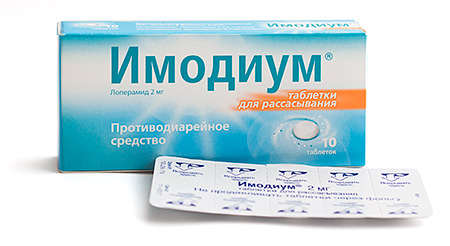 Loperamide is used for acute non-infectious diarrhea, as well as for mild to moderate infectious diarrhea. Loperamide is the drug of choice for the treatment of traveler's diarrhea. The action of the drug occurs quickly and lasts 4-6 hours. Loperamide inhibits intestinal motility, increases the tone of the anal sphincter, thereby reducing the urge to defecate and keeps feces in the rectum.
Loperamide is used for acute non-infectious diarrhea, as well as for mild to moderate infectious diarrhea. Loperamide is the drug of choice for the treatment of traveler's diarrhea. The action of the drug occurs quickly and lasts 4-6 hours. Loperamide inhibits intestinal motility, increases the tone of the anal sphincter, thereby reducing the urge to defecate and keeps feces in the rectum.
Loperamide stimulates opioid mu-receptors in the intestinal wall, resulting in inhibition of the release of acetylcholine and prostaglandins, which, in turn, leads to a decrease in propulsive intestinal motility and an increase in the transit time of its contents. Thus, the absorption time of water and electrolytes increases, their loss decreases and the loss decreases and the time of the protective action of immunoglobulins, which are released into the intestinal lumen during acute intestinal diarrhea, increases. Loperamide increases the tone of the anus sphincter, resulting in a decrease in the frequency and severity of the urge to defecate. Loperamide reduces mucus hypersecretion in the colon, in addition, it has an antisecretory effect, which is realized through both opioid and non-opioid receptors. Loperamide, due to the inhibition of calmodulin and blockade of calcium channels and due to the suppression of intestinal peptides and neurotransmitters that increase the permeability of plasma membranes, affects intestinal secretion (Ivashkin V.T.). 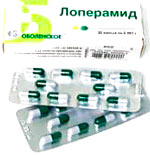
Currently, loperamide is the most effective drug with antidiarrheal action, and its antidiarrheal effect is due to inhibition of both the motor component of diarrhea and intestinal secretion. Loperamide belongs to the group of synthetic opiates, but binds only to peripheral opiate receptors, does not have a systemic narcotic effect, and does not penetrate the blood-brain barrier. This is due to the peculiarities of its biotransformation during the first passage through the liver and the absence of active metabolites in the blood. Loperamide can be successfully used in motor diarrhea with increased peristalsis (irritable bowel syndrome (IBS) and functional diarrhea), but is not effective in diabetic enteropathy, scleroderma, amyloidosis. Moreover, in these situations, it can exacerbate diarrhea. With secretory diarrhea, loperamide is also very effective due to its antisecretory opiate-like action. With infectious diarrhea, the drug should be prescribed with caution, since the delay of the infectious agent in the body increases diarrhea and intoxication. Loperamide well relieves diarrhea in Crohn's disease, but in ulcerative colitis it is not recommended to prescribe it because of the blocking effect on the tone of the intestinal wall and the risk of developing toxic dilatation (Belousova E.A., Zlatkina A.R.).
 Loperamide is the drug of choice for hypermotor variants of irritable bowel syndrome, the so-called functional diarrhea, which, unlike organic (for example, infectious) diarrhea, occurs mainly in the morning, is associated with psycho-emotional factors and is not accompanied by pathological changes in stool analyses. Loperamide inhibits the release of acetylcholine and prostaglandins in the colon and reduces its motor activity. The dose of loperamide is selected individually and is, depending on the consistency of the stool, from 1 to 6 capsules of 2 mg per day (Sheptulin A.A.).
Loperamide is the drug of choice for hypermotor variants of irritable bowel syndrome, the so-called functional diarrhea, which, unlike organic (for example, infectious) diarrhea, occurs mainly in the morning, is associated with psycho-emotional factors and is not accompanied by pathological changes in stool analyses. Loperamide inhibits the release of acetylcholine and prostaglandins in the colon and reduces its motor activity. The dose of loperamide is selected individually and is, depending on the consistency of the stool, from 1 to 6 capsules of 2 mg per day (Sheptulin A.A.).
Loperamide, as a drug that inhibits intestinal motility, is recommended for use in the drug therapy of diabetic diarrhea (Kolesnikova E.V.). With anorectal dysfunction, which is a complication diabetes, symptomatic therapy with loperamide will have a positive result and reduce the symptoms of imperative urges (Leites Yu.G., Galstyan G.R., Marchenko E.V.).
Professional medical publications concerning the effects of loperamide on the gastrointestinal tract :
- Belousova E.A., Zlatkina A.R. Diarrhea syndrome in the practice of a gastroenterologist: pathophysiology and a differentiated approach to treatment. Pharmateka. 2003, no. 10, p. 65-71.
- Sheptulin A.A. Diagnosis and treatment of gastrointestinal motility disorders.
- Kolesnikova E.V. Endocrine diseases and pathology of the digestive system // Journal "Mistetstvo Likuvannya". Ukraine. - 2006. - 8(34).
- Leites Yu.G., Galstyan G.R., Marchenko E.V. Gastroenterological complications of diabetes mellitus. Consilium Medicum. 2007. No. 2.
- The FDA warns of serious cardiac problems with large doses of the antidiarrheal drug loperamide (Imodium), including abuse and misuse.
- non-infectious diarrhea of various forms and different genesis: acute and chronic, allergic, emotional, medicinal, radiation, due to changes in diet and type of food, due to metabolic and absorption disorders
- infectious diarrhea (as an adjuvant)
- stool regulation in patients with ileostomy
 Dosage and administration:
inside (capsules - without chewing, drinking water; lingual tablet - on the tongue, it disintegrates within a few seconds, after which it is swallowed with saliva without drinking water). In acute diarrhea, adults are prescribed an initial dose of 4 mg; then 2 mg after each act of defecation (in the case of liquid feces); the highest daily dose is 16 mg. When administered in drops: initial dose - 60 drops of a 0.002% solution; then 30 drops after each act of defecation; the maximum dose is 180 drops per day (for 6 times). In chronic diarrhea, adults are prescribed 4 mg per day. The maximum daily dose is 16 mg. In acute diarrhea, children over 5 years of age are prescribed an initial dose of 2 mg, then 2 mg after each act of defecation; the maximum daily dose is 8 mg. Drops: initial dose of 30 drops of a 0.002% solution; then 30 drops 3 times a day; the maximum dose is 120 drops per day (for 4 doses). In chronic diarrhea for children over 5 years old, loperamide is prescribed in a daily dose of 30 drops or 2 mg. Children aged 2-5 years are prescribed in a solution for oral administration, 5 ml (1 measuring cap) per 10 kg; frequency of appointment - 2-3 times a day. The maximum daily dose is 6 mg per 20 kg. If a normal stool appears or if there is no stool for more than 12 hours, the drug is canceled (Instructions for use).
Dosage and administration:
inside (capsules - without chewing, drinking water; lingual tablet - on the tongue, it disintegrates within a few seconds, after which it is swallowed with saliva without drinking water). In acute diarrhea, adults are prescribed an initial dose of 4 mg; then 2 mg after each act of defecation (in the case of liquid feces); the highest daily dose is 16 mg. When administered in drops: initial dose - 60 drops of a 0.002% solution; then 30 drops after each act of defecation; the maximum dose is 180 drops per day (for 6 times). In chronic diarrhea, adults are prescribed 4 mg per day. The maximum daily dose is 16 mg. In acute diarrhea, children over 5 years of age are prescribed an initial dose of 2 mg, then 2 mg after each act of defecation; the maximum daily dose is 8 mg. Drops: initial dose of 30 drops of a 0.002% solution; then 30 drops 3 times a day; the maximum dose is 120 drops per day (for 4 doses). In chronic diarrhea for children over 5 years old, loperamide is prescribed in a daily dose of 30 drops or 2 mg. Children aged 2-5 years are prescribed in a solution for oral administration, 5 ml (1 measuring cap) per 10 kg; frequency of appointment - 2-3 times a day. The maximum daily dose is 6 mg per 20 kg. If a normal stool appears or if there is no stool for more than 12 hours, the drug is canceled (Instructions for use). In acute diarrhea, the use of the lingual form of loperamide is preferable. The lingual tablet dissolves on the tongue within 2-3 seconds, the required concentration in the body is reached within one hour, which is faster than when using other dosage forms. Lingual tablet does not require drinking water, can be used in patients with difficulty swallowing and increased gag reflex.
For chronic diarrhea, for IBS, the usual dosage form loperamide. Promising is the drug with a complex active substance loperamide + simethicone, which effectively absorbs gases in the intestine.
WHO position on the use of loperamide in the treatment of diarrhea in children :
The following loperamide-containing medicines are registered in the US: Diamode, Imodium A-D, Imodium A-D EZ Chews, Imodium A-D New Formula, Kao-Paverin, Kaopectate 1-D, Imodium, Maalox Anti-Diarrheal, Pepto Diarrhea Control, Imotil, Diar-Aid. In the United States, drugs can be either OTC or prescription, depending on the loperamide content.
Instructions for different manufacturers of loperamide
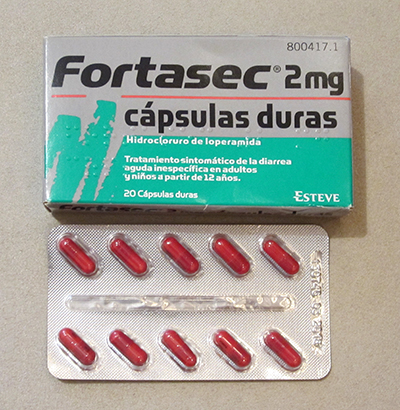 The instructions of some manufacturers of medicinal products containing loperamide as the only active ingredient(pdf):
The instructions of some manufacturers of medicinal products containing loperamide as the only active ingredient(pdf): - for Russia: "Instruction for the use of the drug Loperamide-Akri", JSC "Akrikhin"
- for Ukraine (in Russian): "Instruction for the medical use of the drug Loperamide", JSC "Kyivmedpreparat"
Loperamide has contraindications, side effects and application features, consultation with a specialist is necessary.
The whole family is susceptible to contamination by food germs that lead to indigestion. Loperamide comes to the rescue with such diseases. This drug is classified as an antidiarrheal.
It slows down the passage of feces in the intestines and narrows the anal passage. This helps prevent dehydration of the body. Symptoms of diarrhea pass quickly, and the drug lingers in the gastrointestinal tract for about 5-6 hours.
Produced in the form of tablets (capsules) of 10 pieces per pack. The main substance loperamide hydrochloride 2 mg.
Indication for use
- infectious diarrhea.
- Inflammation and pain of the gastrointestinal tract.
- Treatment of acute diarrhea, which is caused by various factors (allergies, poisoning).
- Acute diarrhea.
- Diarrhea after surgery.
Contraindications of the drug
- Acute colitis caused by the use of antibiotics.
- Bloating and constipation.
- It is forbidden to give the drug up to 2 years.
- Allergy to the active substance Loperamide.
- diarrhea accompanied by spotting and a rise in temperature.
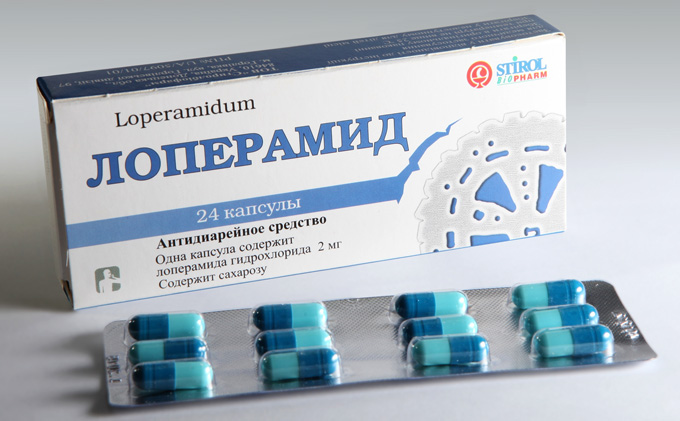
Can it be given to children?
It is forbidden to give the drug to children under 2 years of age. If the child is older than this age, then the medicine is given with frequent urge to the toilet and loose stool. It doesn't matter what caused the disease - allergies, food poisoning or stressful condition. Along with tablets, it is necessary to give the child plenty of fluids to prevent dehydration.
If within a few days after taking the drug the child's condition remains the same, it is necessary to take tests to identify the infection that provoked the disease. The drug is stopped if: the stool is normal, the visit to the toilet has stopped within 12 hours. Also, special attention should be paid to the child's diet, not to give "irritants" that can continue the disease.
Instruction
Adults with diarrhea need to drink 2 capsules of the medicine. After each trip to the toilet, you need to take another 1 tablet of Loperamide.
Children - 1 capsule, and also after each act of defecation. To avoid overdose, adults should reduce the use of the drug to 8 capsules, and children to 3 tablets.
Dosage of the drug for children:
- Children under 5 years of age are given the medicine 3 times a day, 1 tablet.
- For children under 8 years of age, the drug is given 2 times a day, 2 tablets.
- Children under 12 years of age are given 2 capsules 3 times a day.
If diarrhea does not recede within a day, then it is allowed to give the drug after each act of defecation. In this period, you can increase the dosage at the rate of 6 ml per 20 kg of the child.
There is also "Loperamide" in drops, it is given 30 drops 4 times a day. Maximum dose for one day 120 drops. Before using the drug, consult your doctor!
Admission instructions
If within 2-3 days the patient's condition does not improve, then you need to see a doctor for further treatment. If there is a delay in feces or swelling and soreness of the abdomen, you must immediately stop taking the drug.
Side effects
Appear as a result of uncontrolled use of the drug:
- Intestinal colic.
- Increased dry mouth.
- Dizziness, less often short-term loss of consciousness.
- Insomnia.
- Decreased brain activity.
- Nausea accompanied by vomiting.
- Allergy on the skin, which resembles hives.
- Stomach pain and discomfort.
- Very rarely - urinary retention.
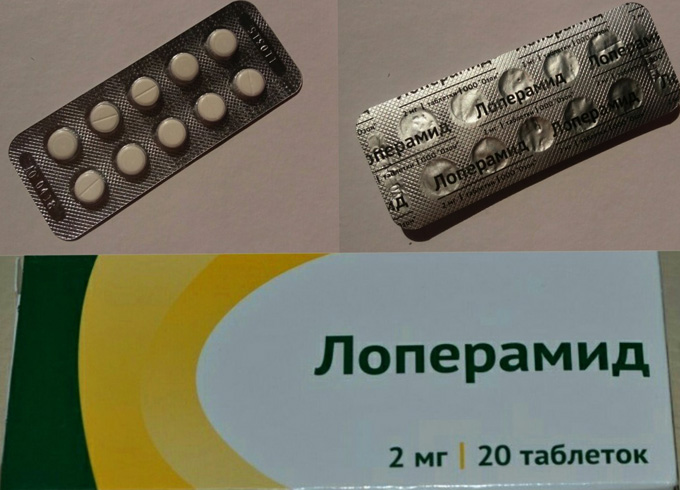
Overdose
Irritability caused by depression of the central nervous system, muscle tone decreases, coordination is lost, drowsiness occurs, and intestinal obstruction is possible.
If an overdose is detected, it is necessary to drink activated charcoal at the rate of 1 tablet per 10 kg of the patient and do a gastric lavage. You need to visit a gastroenterologist within 48 hours.
Drug analogues
- Imodium.
- Dialor.
- Superilor.
- Loperacap.
- Laremid.
- Enterobene.
- Diara.
- Loperamide-acry.
- Laremid.
- Loperamide Grindeks.
Why is loperamide dangerous?
At an early age, children should be given the drug with extreme caution. Intestinal obstruction occurs at an early age, which leads to undesirable consequences.
